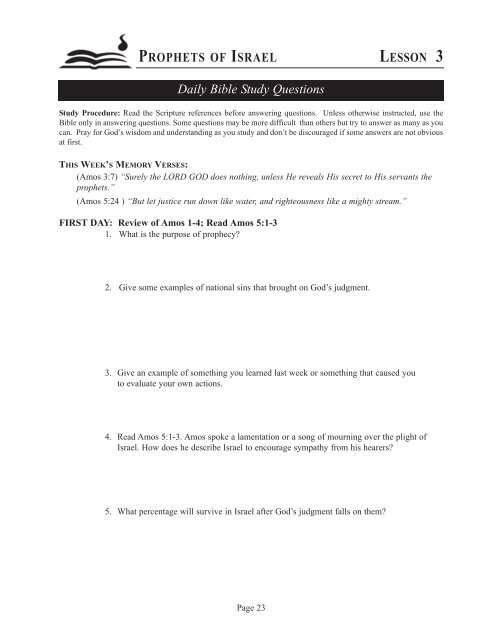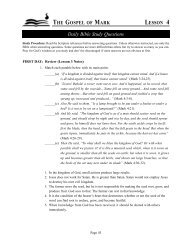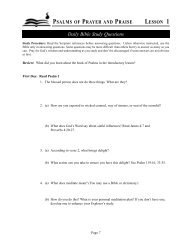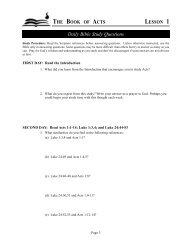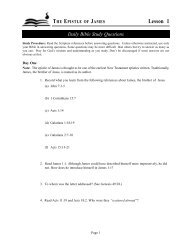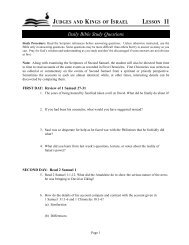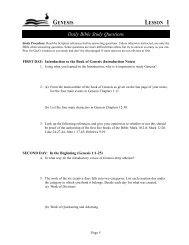Prophets Of Israel Bk 1 rev 5-05.qxp - Explorer's Bible Study
Prophets Of Israel Bk 1 rev 5-05.qxp - Explorer's Bible Study
Prophets Of Israel Bk 1 rev 5-05.qxp - Explorer's Bible Study
You also want an ePaper? Increase the reach of your titles
YUMPU automatically turns print PDFs into web optimized ePapers that Google loves.
PROPHETS OF ISRAEL<br />
LESSON 3<br />
Daily <strong>Bible</strong> <strong>Study</strong> Questions<br />
<strong>Study</strong> Procedure: Read the Scripture references before answering questions. Unless otherwise instructed, use the<br />
<strong>Bible</strong> only in answering questions. Some questions may be more difficult than others but try to answer as many as you<br />
can. Pray for God’s wisdom and understanding as you study and don’t be discouraged if some answers are not obvious<br />
at first.<br />
THIS WEEK’S MEMORY VERSES:<br />
(Amos 3:7) “Surely the LORD GOD does nothing, unless He <strong>rev</strong>eals His secret to His servants the<br />
prophets.”<br />
(Amos 5:24 ) “But let justice run down like water, and righteousness like a mighty stream.”<br />
FIRST DAY: Review of Amos 1-4; Read Amos 5:1-3<br />
1. What is the purpose of prophecy?<br />
2. Give some examples of national sins that brought on God’s judgment.<br />
3. Give an example of something you learned last week or something that caused you<br />
to evaluate your own actions.<br />
4. Read Amos 5:1-3. Amos spoke a lamentation or a song of mourning over the plight of<br />
<strong>Israel</strong>. How does he describe <strong>Israel</strong> to encourage sympathy from his hearers?<br />
5. What percentage will survive in <strong>Israel</strong> after God’s judgment falls on them?<br />
Page 23
LESSON 3<br />
PROPHETS OF ISRAEL<br />
SECOND DAY: Read Amos 5:4-27<br />
6. Read Amos 5:4-15. What phrases were specific calls to repentance so that God’s<br />
judgment might be escaped?<br />
7. Amos gave another list of <strong>Israel</strong>’s sins. Categorize them below.<br />
(a) Sins against the poor<br />
(b) Rebellion against authority<br />
(c) Perversion of justice<br />
8. Read Amos 5:16-20. This passage introduces a biblical concept that will be repeated often<br />
by the prophets. It is called the “day of the LORD” and was believed to be a series of endtime<br />
events in which God would “pass through” the earth for judgment. However, the<br />
<strong>Israel</strong>ites of Amos’ day thought that, as in the time of the exodus from Egypt, they would<br />
be “passed over” while only their enemies would be judged. What does Amos tell them to<br />
correct this thinking?<br />
9. Read Amos 5:21-24. The <strong>Israel</strong>ites at this time could be described as being very religious,<br />
constantly involved in religious activities. The problem was, however, that they had lost<br />
sight of the God they were to worship and improvised activities that appealed to their own<br />
senses and had no sanctifying effect on their relationships with others. What did God think<br />
of their activities?<br />
10. What did He want from them instead?<br />
11. Read Amos 5:25-27. They had a long history of disobedience. Where were they ultimately<br />
headed?<br />
Page 24
LESSON 3<br />
PROPHETS OF ISRAEL<br />
THIRD DAY: Read Amos 6 and 7<br />
12. Read Amos 6:1-14. Amos spoke a series of “woes” to <strong>Israel</strong>. Who was in trouble and why?<br />
13. Justice and righteousness are recurring themes in Amos. Review the following verses<br />
and then comment on why you think these things are so important to God:<br />
(Amos 5:7) “You who turn justice to wormwood, and lay righteousness to rest in the earth!”<br />
(Amos 5:12) “For I know your manifold transgressions and your mighty sins: afflicting<br />
the just and taking bribes; diverting the poor from justice at the gate.” (Note: Business was<br />
transacted and disputes were settled by the civic leaders at the city gate.)<br />
(Amos 5:15) “Hate evil, love good; establish justice in the gate. It may be that the LORD<br />
God of hosts will be gracious to the remnant of Joseph.”<br />
(Amos 5:24) “But let justice run down like water, and righteousness like a mighty stream.”<br />
(Amos 6:12) “Do horses run on rocks? Does one plow there with oxen? Yet you have turned<br />
justice into gall, and the fruit of righteousness into wormwood....”<br />
14. Read Amos 7:1-9. Name the first three visions of judgment on <strong>Israel</strong>.<br />
15. Amos asked God not to send the first two. How would the third one be preferable to the<br />
first two?<br />
16. Read Amos 7:10-17. The Holy Spirit created this pause in the pronouncements of the Lord<br />
through Amos to <strong>rev</strong>eal a little bit of the persecution Amos faced as a prophet. The priest<br />
Amaziah would find that it was quite dangerous to try to stop God’s prophet from speaking<br />
out. What was to happen to Amaziah as a result of his improper interference?<br />
FOURTH DAY: Read Amos 8<br />
17. Read Amos 8:1-3. Explain the meaning of the fourth vision.<br />
Page 25
LESSON 3<br />
PROPHETS OF ISRAEL<br />
18. Read Amos 8:4-6. When a person is not right with God, he cannot be consistently right in<br />
his relationships with others. What new examples are given to illustrate this?<br />
19. Read Amos 8:7-10. When God finally moves in judgment, how will the earth mirror His<br />
feelings? (You will notice as our study continues that other prophets will emphasize these<br />
same signs as those ushering in the “day of the LORD.”)<br />
20. Read Amos 8:11-14. What kind of famine will hit the land in the future?<br />
FIFTH DAY: Read Amos 9<br />
21. This final vision is startling. Read Amos 9:1-10 carefully and then match the following:<br />
_____(a) where Amos saw the Lord standing<br />
_____(b) what God called to be struck and shaken<br />
_____(c) what people will mistakenly think they can do to hide from God’s wrath<br />
_____(d) two sources of judgment at God’s disposal<br />
_____(e) examples of God’s unequaled power<br />
_____(f) what God will do to His sinful kingdom<br />
_____(g) what God will do to allow a remnant to be saved<br />
1. at His touch the earth melts, layers are formed in the sky and strata in the earth, the<br />
sea pours forth on earth, the hosts of heaven obey Him as Lord<br />
2. dig into hell, climb into heaven, hide on top of Mount Carmel, hide in the bottom of<br />
the sea<br />
3. doorposts and thresholds<br />
4. sift the house of <strong>Israel</strong> as in a sieve, no real kernel will be allowed to perish<br />
5. serpents and swords<br />
6. by the altar<br />
7. destroy it but not utterly<br />
22. Read Amos 9:13. Again Amos emphasized the way the earth accentuates God’s actions<br />
in the spirit realm. When the “day of the LORD” commences at the end of time and God<br />
re-establishes <strong>Israel</strong> with her full blessings during the Millennium, just how wonderfully<br />
productive will the earth be?<br />
Page 26
LESSON 3<br />
PROPHETS OF ISRAEL<br />
23. The wrong-thinking that Amos was called to correct in his own people was that even though<br />
they knew that God would one day judge all unrighteousness everywhere, they believed that<br />
their membership in the family of <strong>Israel</strong> exempted them from that final judgment. Discuss,<br />
if you can, what problems you have seen occur when a person confuses church membership<br />
or family heritage with an authentic relationship with God through faith in Jesus Christ.<br />
(See Romans 9:6.)<br />
Page 27
AMOS 5-9<br />
Notes<br />
Amos’ Third Sermon: Lament over<br />
<strong>Israel</strong> (Amos 5:1-9)<br />
Amos changed imagery for his third sermon.<br />
The first one had appealed to human logic (Amos<br />
3), while the second had compared the women of<br />
<strong>Israel</strong> to over-fed cows (Amos 4). Here he depicted<br />
the nation as a young girl, a virgin who had fallen<br />
down, helpless and friendless. This choice of<br />
imagery emphasized that up to now <strong>Israel</strong>, on the<br />
whole, had been protected from any brutal attack<br />
from outside nations. Like a virgin daughter, she<br />
had been carefully cherished in her father’s<br />
household. But Amos now saw her as vulnerable to<br />
attack, with her father’s protection withdrawn. How<br />
bad would things get for <strong>Israel</strong>? Amos prophesied<br />
that only ten percent of the people would survive the<br />
judgments that were going to fall! In a plea for<br />
<strong>Israel</strong> to turn and be saved, God said through Amos:<br />
“Seek Me and live....” (Amos 5:4) and then<br />
emphasized that her idolatrous worship at Bethel<br />
and Gilgal would not save the nation. Amos<br />
repeated the call to repentance, “Seek the LORD<br />
and live....” (verse 6) and then clarified that the God<br />
of <strong>Israel</strong> was no less than the Lord of all creation:<br />
“He made the Pleiades and Orion; He turns the<br />
shadow of death into morning and makes the day<br />
dark as night; He calls for the waters of the sea and<br />
pours them out on the face of the earth...” (verse 8).<br />
God Hates Injustice (Amos 5:10-17)<br />
In Old Testament times, business was transacted<br />
and personal disputes were settled by the elders who<br />
sat at the city gates. (See examples in Deuteronomy<br />
21:19, Deuteronomy 22:15, and Joshua 20:4.) God<br />
had directed through His laws that fairness, honesty,<br />
and justice were to characterize all the interactions<br />
of His people (Exodus 23). Amos voiced God’s<br />
anger over what was happening in the city gates of<br />
<strong>Israel</strong>. Instead of respect for righteous decisions,<br />
people were actually angry when justice took place<br />
(Amos 5:10). They afflicted the godly leaders and,<br />
when in charge themselves, accepted bribes to rule<br />
against the poor (verse 12). Because of such abuse,<br />
Amos announced the rich would not be allowed to<br />
enjoy the fine stone homes they had built or the<br />
wine from the lush vineyards they had planted<br />
(verse 11). God hated what they were doing to each<br />
other. God’s people were to seek good and not evil.<br />
In fact, they were to hate evil and actively pursue<br />
good. The city gates were to be places of justice. If<br />
change did not occur soon, the proud and<br />
unscrupulous of <strong>Israel</strong> would be weeping and<br />
wailing over the trouble that the Lord would send.<br />
The Day of the Lord (Amos 5:18)<br />
Amos referred to the “day of the LORD” in<br />
this rebuke of <strong>Israel</strong>. The “day of the LORD” was a<br />
term used by many of the Old Testament prophets.<br />
It introduced and included a series of events which<br />
would occur at the end of time. As this year’s study<br />
continues, we will examine various aspects of this.<br />
Here are some basic things that need to be<br />
understood about “the day of the LORD” right from<br />
the beginning:<br />
1. God sets the date. Jesus told His disciples<br />
that only the Father knew the timing of these last<br />
events (Mark 13:32).<br />
2. It will be preceded by universally-seen signs<br />
and wonders in the heavens (Joel 2:1,2; Matthew<br />
24:29; Revelation 6:12-14).<br />
3. It will usher in a series of judgments on all<br />
unrighteousness (Matthew 25:31-46; Jude 1:14,15;<br />
Revelation 20:11-15).<br />
4. It will include a thousand-year reign of<br />
Christ and a literal kingdom on earth for <strong>Israel</strong> in<br />
which she shall fully enjoy every promise God has<br />
made to her (Isaiah 11:1-12; Revelation 20).<br />
5. Those escaping the wrath of God will be<br />
those who have been redeemed by the blood of<br />
Jesus. Good works or being a descendant of<br />
Abraham will not save anyone. Those in the Old<br />
Testament were saved by faith in God’s salvation<br />
which would come through Messiah (Genesis<br />
15:4-6; Revelation 20:13-15); those living after the<br />
Cross are saved by faith in Messiah who has come<br />
(Acts 4:12).<br />
Page 28
LESSON 3<br />
PROPHETS OF ISRAEL<br />
<strong>Israel</strong>’s Misconception of the Day of<br />
the Lord: Woe to the Ignorant! (Amos<br />
5:18-27)<br />
With this first “woe,” Amos boldly corrected<br />
<strong>Israel</strong> for her deadly misunderstanding of the “day<br />
of the LORD.” Many in <strong>Israel</strong> thought that since the<br />
promises to <strong>Israel</strong> were sure and certain, it was<br />
inevitable that they all would be blessed when the<br />
Lord finally put the world in proper order by<br />
coming in ultimate judgment. Amos assured his<br />
listeners that those practicing unrighteousness could<br />
not claim the promises. Paul, centuries later, had to<br />
explain the same thing to the Jews of his day:<br />
“...they are not all <strong>Israel</strong> who are of <strong>Israel</strong>”<br />
(Romans 9:6). The “day of the LORD” for those<br />
who clung to a religious heritage instead of right<br />
relationship with God would be a terrible time. It<br />
would be as bad as if in running to escape a lion, one<br />
ran into a bear!<br />
Those in <strong>Israel</strong> during the time Amos was<br />
prophesying were having a wonderful time going to<br />
the shrines they had set up in Bethel and Gilgal,<br />
singing their songs, offering their sacrifices, and<br />
enjoying their portions of the offered meat.<br />
However, because none of this was in accordance<br />
with God’s law, but was instead wholly their own<br />
invention or improvisation, God hated it all and<br />
would not bless any of it. Going through the<br />
motions of spiritual activity had never been at the<br />
heart of right worship. <strong>Israel</strong> had been loved by God<br />
even when she could not (or did not) worship<br />
properly in the wilderness (verse 25). The right<br />
spiritual condition of the heart, as evidenced in<br />
righteous actions toward the weak and poor, was<br />
what God desired: “But let justice run down like<br />
water, and righteousness like a mighty stream”<br />
(Amos 5:24). The people of <strong>Israel</strong> had failed to do<br />
this, and the Lord had come to a verdict: the whole<br />
nation would be taken into captivity beyond<br />
Damascus, Syria. Their future was bleak.<br />
Woes Continue (Amos 6)<br />
After pronouncing woe on the ignorant who<br />
thought the “day of the LORD” would be to their<br />
advantage, Amos spoke woe on the indulgent.<br />
Many continued to pamper themselves by lounging<br />
on beds of ivory and eating rich meats instead of<br />
paying attention to God’s judgment that had already<br />
started on the unrighteous heathen around them.<br />
Not only were they self-indulgent, they were also<br />
insensitive to the needs of others (Amos 6:6), even<br />
those of their own nation. Common sense would<br />
advise against running horses or driving oxen over<br />
rock, yet common sense had not kept many in <strong>Israel</strong><br />
from continuing to manipulate the justice system to<br />
abuse the poor while enriching themselves. God<br />
would soon show them how such injustice really<br />
felt, when He allowed them to be abused by<br />
merciless foreign invaders.<br />
The First Three Visions of Amos<br />
(Amos 7:1-9)<br />
A frequent way in which God communicated<br />
His messages to His prophets was by giving them<br />
visions of His planned actions. Amos began to<br />
<strong>rev</strong>eal what God had shown him.<br />
1. The first vision was of a plague of locusts<br />
that was to be let loose to consume the second and<br />
larger harvest of <strong>Israel</strong>’s farmers. The horror of the<br />
indiscriminate destruction of these hordes terrified<br />
Amos, and he begged God to relent because he<br />
knew such a plague would destroy little <strong>Israel</strong>. The<br />
Lord answered his request and did not send the<br />
locusts (Amos 7:1-3).<br />
2. The second vision was of a consuming fire<br />
over the land and water sources. Again Amos<br />
interceded because of the complete devastation this<br />
would cause, and “the LORD relented concerning<br />
this” (Amos 7:4-6).<br />
3. The third vision was of the Lord Himself<br />
standing on a straight wall, holding a plumb line. A<br />
plumb line was a string or cord to which a heavy<br />
object was attached. When held at the end with the<br />
weighted part allowed to hang freely, gravity would<br />
pull the weight downward and keep the cord<br />
perfectly perpendicular to the ground, providing a<br />
guideline for building something level or a visual<br />
standard for discerning the crookedness of<br />
something already erected. In this vision, God<br />
Himself did the judging of whether or not an<br />
individual was “level” or righteous, according to the<br />
plumb line of His holiness. His would not be an<br />
indiscriminate judgment, as with the locust or fire,<br />
but a righteous evaluation of whether each person<br />
Page 29
LESSON 3<br />
PROPHETS OF ISRAEL<br />
had come into conformity with His standard. <strong>Of</strong><br />
course, the idolatrous places of the day would be<br />
condemned and idol-shrines doomed to destruction.<br />
Interrupted by Amaziah (Amos 7:10-17)<br />
This is the only historical and personal<br />
interlude in the prophecies of Amos. Foolishly<br />
Amaziah, the priest of Bethel, tried to stop the efforts<br />
of Amos by reporting him to King Jeroboam II.<br />
Inaccurately, according to the record of Amos’<br />
prophecies we have, Amaziah claimed Amos had<br />
prophesied the death of Jeroboam by sword. This<br />
did not occur (2 Kings 14:28,29), so was obviously<br />
not spoken by Amos because God’s true prophets<br />
were always absolutely accurate (Deuteronomy<br />
18:21,22). The direct quote from the prophecy of<br />
Amos was “I will rise with the sword against the<br />
house of Jeroboam” (Amos 7:9). The prophecy was<br />
general, not personal.<br />
Still today, those who oppose God’s word or<br />
work often twist or change Scripture to incite others<br />
to react. Throughout the ages, religious leaders have<br />
been guilty of such interference with the true work<br />
of God. Jesus pronounced a woe on the leaders of<br />
His day for this: “But woe to you, scribes and<br />
Pharisees, hypocrites! For you shut up the kingdom<br />
of heaven against men; for you neither go in<br />
yourselves, nor do you allow those who are entering<br />
to go in” (Matthew 23:13).<br />
Using another tactic still common today when<br />
an unpopular message is being given, Amaziah<br />
attacked Amos personally, attempting to discredit<br />
his authority and his right to speak for God. It was<br />
true that Amos was not from a recognized school or<br />
family of prophets. He was a “sheepbreeder and a<br />
tender of sycamore fruit” when God called him out<br />
and entrusted him with these messages to <strong>Israel</strong>.<br />
Amos had obediently responded to God’s call.<br />
to be found opposing God or disparaging His<br />
messengers!<br />
Fourth Vision: Ripened Fruit<br />
(Amos 8:1-3)<br />
The Lord showed Amos a bowl of ripe summer<br />
fruit. Like <strong>Israel</strong> at the height of her present<br />
prosperity, nothing could be more appealing.<br />
However, the ripeness would very soon give away<br />
to a rottenness that would require disposal. God said<br />
that the end was coming and that He would not<br />
return to rescue <strong>Israel</strong> again. The worship songs of<br />
which they were so proud would soon be turned to<br />
howlings over the dead bodies that would fall<br />
permanently silent. The nearer judgment to which<br />
this refers was the captivity of <strong>Israel</strong> by Assyria.<br />
The judgments of the “day of the LORD” would<br />
come also but not until the distant future.<br />
Another Sermon (Amos 8:4-10)<br />
In another effort to awaken his listeners to their<br />
need for repentance, Amos began to catalog more of<br />
their sins. Even though they superficially observed<br />
some of God’s laws, like those for keeping Sabbath<br />
or observing the new moons, they were actually<br />
anxious to get the observances over so that they<br />
could continue in their dishonest trade practices.<br />
They used inaccurate scales to give less of their<br />
goods while demanding more from their customers<br />
in payment. They overcharged the needy and then<br />
added the sweepings from the ground to increase the<br />
appearance of the volume of wheat sold to them.<br />
God Himself was watching and remembering<br />
every dishonest act, and He called on earth and<br />
heaven to react against such wickedness (Amos<br />
8:8,9). God would not allow the crooked merchants<br />
of <strong>Israel</strong> to benefit long from their dishonesty<br />
against the poor. He would soon turn their times of<br />
celebration into bitter days of mourning (verse 10).<br />
As punishment for his efforts to keep the<br />
Lord’s warnings from <strong>Israel</strong>, Amaziah and his<br />
family would have some terrible experiences:<br />
“Therefore thus says the LORD: ‘Your wife shall<br />
be a harlot in the city; your sons and daughters<br />
shall fall by the sword; your land shall be divided<br />
by survey line; you shall die in a defiled land; and<br />
<strong>Israel</strong> shall surely be led away captive from his<br />
own land’” (Amos 7:17). It is certainly dangerous<br />
Page 30<br />
A Different Kind of Famine<br />
(Amos 8:11-14)<br />
The written word of God is a gift we too often<br />
underestimate. How could we know God if He had<br />
not left us this <strong>rev</strong>elation of Himself? The Scriptures<br />
are our guide to knowing Him, pleasing him, and<br />
knowing what He has promised us. Yet in keeping<br />
with the modern axiom “use it or lose it,” the
LESSON 3<br />
PROPHETS OF ISRAEL<br />
continual disregard for the written word of God will<br />
one day result in His removing it from the world<br />
altogether. Amos prophesied a time when people<br />
would be starving for it but would not be able to<br />
gain access to it. Today, as in the time of Amos,<br />
even supposedly religious people are not studying<br />
and obeying the Scriptures as they should. What<br />
will it be like when a <strong>Bible</strong> cannot be found at all?<br />
The Vision of the Lord Dispensing<br />
Judgment (Amos 9:1-10)<br />
The fifth vision Amos was shown was of God<br />
Himself standing upon the altar and commanding<br />
judgment to begin. Amos warned that at such a time<br />
there would be absolutely no place to escape. The<br />
earth itself would melt at God’s touch (verse 5). He<br />
would sift the people carefully, in search of any<br />
kernel worthy of keeping, but would find none<br />
(verse 9). (The sifting device used at that time spun<br />
its contents to cause the chaff to cling to the sides so<br />
that whole kernels could fall to the ground.)<br />
However, though the destruction of <strong>Israel</strong> would be<br />
terrible, it would not be absolute. A remnant would<br />
remain (verse 8).<br />
The idea of a remnant of <strong>Israel</strong> being<br />
reestablished in the end times to receive all the<br />
promises of the Scriptures to <strong>Israel</strong> is a recurring<br />
theme repeated by many of the prophets. That<br />
remnant will be the true <strong>Israel</strong>, those descendants of<br />
Abraham from all tribes who have repented of their<br />
sins and come to God in saving faith in His Messiah.<br />
God has never had a double standard. There has<br />
always been only one way of salvation, through<br />
faith in the blood of His Son Jesus. His people<br />
<strong>Israel</strong> will have to accept Him by faith individually<br />
just as the Gentiles will. But in the last days, when<br />
so many in <strong>Israel</strong> will have their eyes opened not<br />
only to see but to believe in Him “whom they<br />
pierced,” the result will be glorious! (See Zechariah<br />
12:10, Romans 11:15, and Revelation 1:7.) God will<br />
then raise up the fallen “tabernacle of David” and<br />
“will raise up its ruins.”<br />
The earth, which had so often echoed God’s<br />
wrath with earthquakes, drought, and famine, will<br />
respond with unequaled productivity. The crops<br />
will be so large that farmers will not finish<br />
harvesting them before it is time to plant again.<br />
Mountains and hills will literally drip with the juice<br />
of their abundant fruit. Unlike their wicked<br />
forefathers, who had been forced from their fine<br />
homes and vineyards before they enjoyed them, the<br />
returned inhabitants will fully enjoy everything: “I<br />
will plant them in their land, and no longer shall<br />
they be pulled up from the land I have given them”<br />
(Amos 9:15).<br />
Major Truths from a Minor Prophet<br />
If someone had not carefully read or studied<br />
the writings of Amos, he might ignorantly remark<br />
about the probable unimportance of such a brief<br />
message. However, those who have studied the<br />
words of Amos must boldly declare the profound<br />
truths they have found in these nine chapters.<br />
1. First, no matter how much a person<br />
participates in religious activities, the test of biblical<br />
righteousness is not in that but rather in how he<br />
treats others in everyday life, especially the weak<br />
and the poor. God hates injustice, insensitivity to the<br />
pain of others, self-centered greed and materialism,<br />
and false worship. Those who practice such are in<br />
the same imminent danger of judgment as the<br />
sinners of Amos’ day because such actions indicate<br />
unregenerate hearts (Matthew 7:20).<br />
2. Next, there will certainly come a “day of<br />
the LORD” in which God will judge swiftly and<br />
completely all ungodly people and all ungodly<br />
actions. None is righteous enough to stand level<br />
against the plumb line held by a holy God (Romans<br />
3:10). None has hope of escaping eternal judgment<br />
except by repenting of all wickedness and appealing<br />
to God to apply the blood of His Lamb which alone<br />
can provide the necessary atonement for sin.<br />
3. One last truth to be shared is that God has<br />
chosen <strong>Israel</strong> out of “all the families of the earth”<br />
(Amos 3:2) to hold a unique place in His prophetic<br />
plans. However, simply being born into the family of<br />
Abraham does not guarantee exemption from earthly<br />
accountability or eternal judgment. The true <strong>Israel</strong>ite<br />
is one who has accepted God’s way of salvation<br />
through Messiah. That one, if alive in the end-times,<br />
shall join with a righteous remnant to enjoy every<br />
blessing God has promised to <strong>Israel</strong> in an actual<br />
kingdom of God on earth for a thousand years.<br />
Page 31
LESSON 3<br />
PROPHETS OF ISRAEL<br />
Amos has introduced some very wonderful<br />
promises and convicting truths which we will see<br />
emphasized and enlarged upon by the prophets that<br />
followed him. God repeats His truths so that we will<br />
not miss them—so that we will hear and obey them.<br />
What have you learned this week which you can<br />
begin to obey right now?<br />
VOCABULARY<br />
1. disparaging: being critical<br />
2. imminent: about to happen<br />
3. improvisation: a performance without preparation<br />
4. indulgent: allowing oneself or another a special or excessive pleasure<br />
5. Pleiades and Orion: constellations of stars<br />
6. remnant: a small remaining group of people<br />
7. unregenerate: unreformed spiritually or morally<br />
Page 32
LESSON 3<br />
PROPHETS OF ISRAEL<br />
Notes<br />
Page 33
LESSON 3<br />
PROPHETS OF ISRAEL<br />
Notes<br />
Page 34


